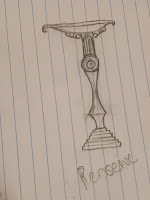

(I wanted the picture to be a little better so it was easier to see the work I put into it. I might upload a new one in the future)
2 of Gryffindor: Domination
Meaning of card facing you: future plans, progress, decisions
Meaning of card facing away from you: fear of unknown, lack of plans
The Ministry of Magic can represent future plans in many ways. Many people, like Hermione, spend their years at Hogwarts preparing for the future by making sure they know enough magic to get into the field they want to work in. In fourth year, Hermione creates SPEW which is an organization that is supposed to be about the protection of Elfish welfare. She doesn't make very much from it but it marks the beginning of her wanting to get involved in magical creature rights. Later, after the war, she ends up in the law department of the Ministry of Magic.
Voldemort had plans for the Ministry of Magic. He wanted to take over the Wizarding world and a very effective way of doing that is infiltrating the Ministry. After taking over by using Imperio-ed wizards and witches, he begins an anti-muggle/muggleborn/halfblood campaign. Obviously these plans don't work out once Harry defeats Voldemort, but it shows that the Ministry was a stepping stone for Voldemort's plans.
You are probably wondering how the Ministry of Magic could fall to one wizard, but the answer is fairly easy. The fear of the unknown made the Ministry a very unstable thing to hold onto. Fudge did not want to believe Harry or Dumbledore that Voldemort was back because he feared that this was the truth. The Minister stuck his head in the dirt and allowed horrible things to happen around him because he didn't want to face the facts. This lead to the Azkaban breakout, Death Eater recruitment, and more. There was a lack of information being given to the public because the Ministry was stopping it from being spread. If the Ministry had, instead of being scared, worked with the Order of the Phoenix, Harry, and Dumbledore, Voldemort might have had a very hard time getting back into power and a lot of damage could have been prevented.
The Ministry of Magic, though it has many problems, is a place of progress and decisions. It's a place where people make laws, and enforce them, as well as creating things for the sake of learning and discovering more about magic. In the fifth book and onwards, we learn more about how the Ministry works. Harry gets taken in for a hearing regarding his use of magic outside of school. There is also the Department of Mysteries where Unspeakables make experiments with magic and do many things they do not speak about. The Ministry is decision making and progress with these things and more, its many departments moving it along and taking care of business.
It's important to remember how much influence the Ministry has. Though it can be incompetent and unwilling to face reality, it controls many things like the newspaper, regulations, school things and more and when it actually uses its power (like Voldemort did) it shows how dominant and strong it can be.




















